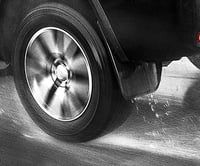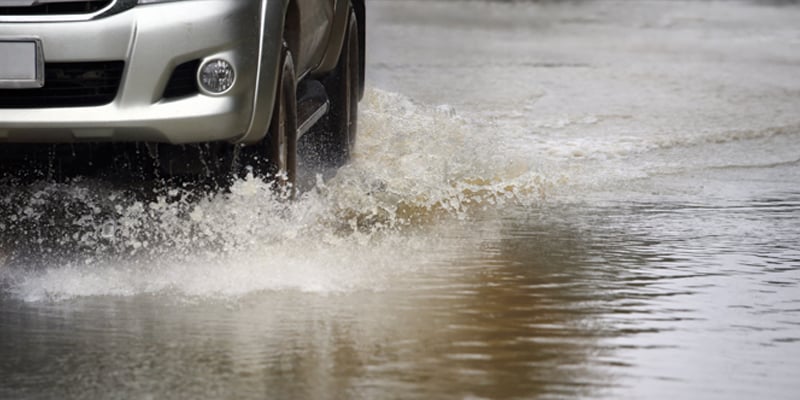Driving in Wet Weather
Safety Moment
- Home
- About Airswift
- Safety
- Safety Moments
- Driving in Wet Weather
Should I drive when it's raining or flooding?
Driving in wet weather conditions can be dangerous. Car breakdowns always increase during periods of wet weather, and driving in severe rain and high water can cause extreme damage to your car and yourself.
What causes a car breakdown in wet weather?
Some car breakdowns occur during periods of wet weather as the damp causes problems with engines and electrical systems, particularly in older vehicles. Many rain-related breakdowns are easily avoidable as they are often caused by people driving through deep standing water. While cars have improved significantly in technical terms in recent years, they are still not waterproof and will break down if they are driven through deep water. When a car is submerged, water is sucked into the engine, causing catastrophic failure.
The engine will lock up and extensive damage to important components like piston connecting rods and valves can occur, which can be extremely expensive. A new engine would have to be fitted, but what people don’t understand is that the owner likely has to foot the expensive bill unless they can demonstrate to their insurer that it was not their actions that caused the damage.
How should I prepare to drive in the rain?
If possible, avoid driving during heavy rain or stormy weather completely. Take a moment to assess the situation and severity of the conditions.
- Consider whether your journey is essential. If not, can it be delayed until after the rain has subsided?
- Regularly inspect your car in dry conditions to avoid mishaps during rainy weather. Check that your windscreen wiper blades are fully functional. If both front and back blades are not clearing properly, get them replaced.
- If you still intend to drive in the wet conditions, there are a handful of steps to keep you safe on the road and help reduce your chances of an accident or breakdown dramatically.
- Make sure you fill your car up with gas. Using your lights and heaters and being caught in traffic use more fuel than driving in normal conditions.
- Let relatives and friends know your intended route and expected time of arrival. When possible, travel with others.
- Carry a mobile phone in case you encounter any difficulties during your journey.
- Pay close attention to slick or closed roads and water build up. Driving on these roads could cause your car to hydroplane.
What is hydroplaning?
 Hydroplaning is a buildup of water between the road surface and your tires causing them to lose contact with the road surface completely. If this happens and you lose control of your vehicle, don’t panic. Stay calm. Don’t make sudden motions and wait for the skid to stop. If it doesn’t stop immediately, ease your foot off the gas and steer in the direction you want the car to go. Be safe, slow down!
Hydroplaning is a buildup of water between the road surface and your tires causing them to lose contact with the road surface completely. If this happens and you lose control of your vehicle, don’t panic. Stay calm. Don’t make sudden motions and wait for the skid to stop. If it doesn’t stop immediately, ease your foot off the gas and steer in the direction you want the car to go. Be safe, slow down!
How can I avoid an accident in the rain?
The best way to avoid getting into in accident if you intend to drive in the rain is to be safe and slow down. Be sure to drive at or below the speed limit to the extent that you are comfortable with and can see far enough in front of you to appropriately make driving decisions.
Here are some tips to avoid getting into an accident if you are driving in the rain:
- Drive slowly
- Keep both hands on the steering wheel at all times
- Keep your headlights on low beam
- Keep a minimum of a five-car length distance between you and the car in front of you
- Use your air conditioner or defroster to keep windows clear of condensation
- Avoid braking suddenly, accelerating, and turning quickly
- Avoid flooded roads or roads covered in water
- Watch out for landslides
What should I do if I get caught driving in a flood?
The following tips should always be followed when driving in flooded conditions:
- Do not attempt to drive through water if you are unsure of the depth. The edge of the curb is a good indicator.
- If you do go through water, drive on the highest section of the road.
- Drive steadily and slowly, so as not to create a bow wave in front of the vehicle and allow oncoming traffic to pass first. Make sure you have a clear route ahead, so you do not have to stop in standing water.
- Driving at high speeds may be dangerous to other vehicles or pedestrians and could cause loss of control.
- Drive a safe distance from the vehicle in front of you. Leave a minimum of a full car’s length of space between you and the car in front.
- Never attempt to drive through fast flowing water. You could easily get swept away. Do not underestimate the strength of the flood waters, as it is strong enough to lift a vehicle.

After leaving flood water, test your brakes. If your engine cuts out after driving through deep water, DO NOT attempt to restart as engine damage may occur. Instead, call for assistance and have the vehicle professionally examined.